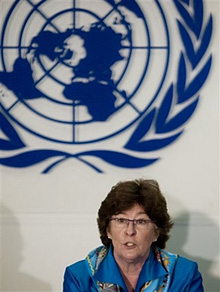
|
 |
 |
 Editorials | Issues | February 2008 Editorials | Issues | February 2008  
UN Official: Waterboarding is Torture
 Lisa J. Adams - Associated Press Lisa J. Adams - Associated Press
go to original


| | Louise Arbour, United Nations High Commissioner for Human Rights, of Canada, speaks during a press conference in Mexico City, Friday, Feb. 8, 2008. Arbour, the UN's top human rights commissioner, said that water boarding qualifies as torture, and that Mexico must treat Central American migrants to this country with the same respect it demands for Mexicans living in the U.S. (AP/Eduardo Verdugo) | | |
Mexico City - The United Nations' top human rights official said Friday that waterboarding — a tactic used by the U.S. in its battle against terror — qualifies as torture.

The Bush administration acknowledged for the first time this week that it waterboarded al-Qaida detainees. Vice President Dick Cheney said it was "a good thing" that the prisoners had been forced to give up helpful information.

The interrogation method involves strapping a person down and pouring water over his cloth-covered face to create the sensation of drowning.

"I would have no difficulty describing the practice as falling under" international definitions of torture, said Louise Arbour, the U.N. high commissioner for human rights, at a news conference wrapping up a four-day visit to Mexico.

She praised "Mexico's international advocacy for the rights of migrant workers, for persons with disabilities and against the death penalty," but expressed concern about Mexico's use of heavily armed soldiers to fight drug trafficking and other organized crime

Arbour said use of the military should be "a short-term solution" and should be used "with maximum human rights protections."

Mexican President Felipe Calderon said this week that he would eventually replace the army with police in the drug battle, but he said soldiers were necessary until the country can clean up a largely corrupt police force.

Asked about reports that Central American migrants are sometimes abused in Mexico, the commissioner called on Mexico "to extend the same level of protection (to the migrants) that it is advocating for Mexican migrants in the U.S." | 
 | |
 |



